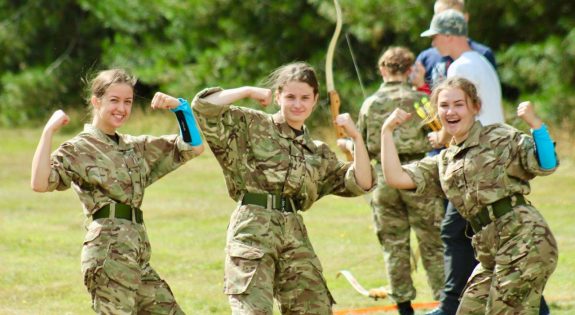News
May 27th 2021
Independent report from University of Northampton celebrates positive impact of Cadet forces
Exciting new research carried out by the University of Northampton into UK Cadet Forces highlights the positive impacts on young peoples’ development, adult volunteers and wider society.
Social impact Cadet Forces UK 2020 report
The UK currently has 130,000 Cadets and almost 30,000 adult volunteers supporting them. This follows the Cadet Expansion Programme launched by the UK Government in 2012 which saw the number of school Cadet units double to over 500 by last year.
During a visit to a Cadet unit based in a South London all-girls school, Defence Minister James Heappey explained that a four-year study conducted by the University of Northampton found participation in the Cadet programmes led to greatly improved communication and leadership skills.
Personal resilience, confidence and an ability to work effectively with a diverse range of people were also recognised as attributes of cadets and adult volunteers.
Cadets form a vital part of the communities they represent
Minister for the Armed Forces, James Heappey said:
“I am delighted to read the positive conclusions from the University of Northampton report into our Cadets, which emphasises the importance of this programme for both young people and adult volunteers.
“Cadets form a vital part of the communities they represent, building confidence, resilience and friendship in a unique setting. This report clearly demonstrates how Cadet Forces benefit our youth by broadening their horizons and unlocking their potential.”

North Hykeham RAF Air Cadets after a successful flight
Education Secretary Gavin Williamson said:
“I have seen for myself how the values of our Armed Forces – those of resilience, self-discipline and perseverance – can benefit so many of our young people with skills they can rely on well into adult life. That, for me, is one of the biggest benefits of this growing programme and why we are expanding it into even more schools.
“This study confirms the positive impact that being a Cadet can have, by levelling up outcomes in education, employment and health for young people.”
Not only were these positive attributes developed within the Cadet Forces; the study found the skills gained through Cadets’ experiences are reflected in other aspects of life.
For example, participation was directly linked to increased social mobility, improved educational outcomes and greater employability.
Additionally, improved mental and physical well-being and strong community links are included in the findings, particularly for those who experience economic or other disadvantages. The well-being benefits from participation may result in fewer visits to the GP or less use of mental health support services.
Cadet Forces provide challenge, discipline, training, education and fun
Professor Simon Denny, Institute for Social Innovation and Impact, the University of Northampton said:
“Our research has concluded that the Cadet Forces provide structured challenge, discipline, training, education and, importantly, fun. Cadets and their adult volunteer instructors gain new skills and qualifications which increase their education and employment opportunities.
“The positive impacts on social mobility are, frankly, amazing. The Cadet Forces represent a very good use of taxpayers’ money.”
The report outlines a significant return on investment in the Cadet Forces, with the Cadet experience offering potentially life-changing opportunities for career progression and vocational qualifications. This results in increased career prospects for those who may not hold traditional educational qualifications.

Nottingham Sea Cadets take to the water
Earlier this year, the Defence Command Paper outlined a refreshed commitment to invest in the Cadet Forces. The MOD will continue to work jointly with the Department for Education to develop and expand the programme to provide this opportunity to more young people.
The Ministry of Defence and Department for Education also announced a further £1.1 million of funding for the Cadet Expansion Programme (CEP) in April 2021. The CEP builds on the Government’s support for children’s wellbeing as they make the transition back to the classroom. It is in addition to its £1.7 billion investment in programmes targeted at young people who may benefit from additional help with academic, social or emotional skills.
Download the report here.
“Cadets form a vital part of the communities they represent, building confidence, resilience and friendship in a unique setting. This report clearly demonstrates how Cadet Forces benefit our youth by broadening their horizons and unlocking their potential.” - Minister for the Armed Forces, James Heappey


